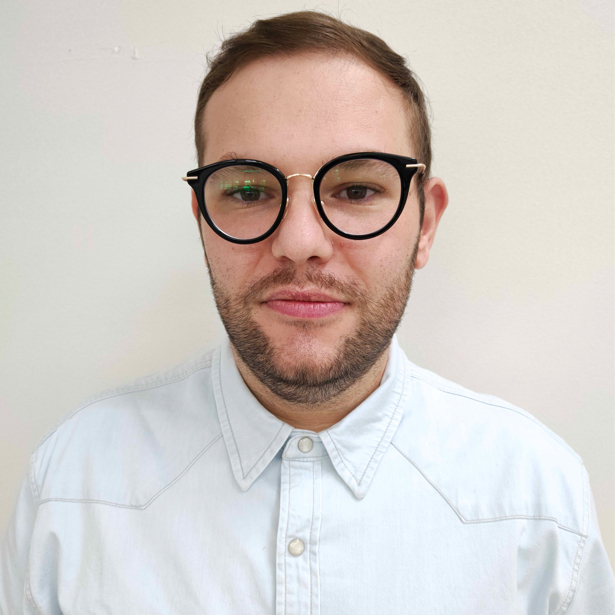You are here :
- EUTOPIA website
- Home
- Research & Innovation
- Fellowship
- SIF - Post-Doctoral Fellowships
SIF 2nd Cohort Fellows - Rafael Marchi, University of Warwick

Rafael is an innovative scientist with a PhD in Inorganic Chemistry, possessing extensive knowledge of bioinorganic and medicinal chemistry. I have significant experience in researching and developing novel antioxidant compounds and biofilms of starch and gelatine (coating or casting) containing those antioxidants to scavenge reactive oxygen species and lipid oxidation protection for industrial applications. He is currently involved in the development of innovative anticancer drugs for photodynamic therapy, focused on the understanding of the interaction of these drugs with DNA as well as on the use of synchrotron techniques to understand the fate metal-based drugs inside cells. Luminescent microscopy and biological tests are areas of his interested. Rafael is recognized for his strong problem-solving skills, collaborative projects, and a robust publication record.
11/2021-07/2022, Member of R&D researcher team at GS-Green Solutions for Life Ltd., Brazil. Development of new antioxidants and antimicrobial compounds containing a metal centre in application for agriculture improvement.
09/2019-03/2020, PhD research internship abroad at Milan University, Italy. Preparation and characterization of biofilms containing antioxidant and antimicrobial compounds for food application
12/2018-01/2019, PhD research internship abroad at Keele University, UK. Performance of pest control assays in relation to aphids using inorganic molecules.
Curriculum Vitae
- Education
09/2017-09/2021, PhD in Science with emphasis in Inorganic Chemistry at Federal University of São Carlos, Brazil
07/2015-08/2018, Master in Inorganic Chemistry at Federal University of São Carlos, Brazil
03/2009-12/2014, BSc in Chemistry at Federal University of São Carlos, Brazil
- Experience
11/2021-07/2022, Member of R&D researcher team at GS-Green Solutions for Life Ltd., Brazil. Development of new antioxidants and antimicrobial compounds containing a metal centre in application for agriculture improvement.
09/2019-03/2020, PhD research internship abroad at Milan University, Italy. Preparation and characterization of biofilms containing antioxidant and antimicrobial compounds for food application
12/2018-01/2019, PhD research internship abroad at Keele University, UK. Performance of pest control assays in relation to aphids using inorganic molecules.
- Publications/Research achievements
Approved patent deposition named “USE OF Mg(II) COMPLEXES”, filed Sept 30th/2021
Front cover for paper published at Quimica Nova, 2021, 44(3), 267–271. DOI: 10.21577/0100-4042.20170693.
Coordination Chemistry Reviews, 2022, 451, 214275. DOI: 10.1016/j.ccr.2021.214275.
European Journal of Inorganic Chemistry, 2022, 2022(11), e202101015.
ACS Omega, 2020, 5(7), 3504-3512
ChemistrySelect, 2021, 6, 8746-8753. DOI: 10.1002/slct.202102283.
https://scholar.google.com/citations?user=aBGza-wAAAAJ&hl=pt-BR
https://www.researchgate.net/profile/Rafael-Marchi-3
Front cover for paper published at Quimica Nova, 2021, 44(3), 267–271. DOI: 10.21577/0100-4042.20170693.
Coordination Chemistry Reviews, 2022, 451, 214275. DOI: 10.1016/j.ccr.2021.214275.
European Journal of Inorganic Chemistry, 2022, 2022(11), e202101015.
ACS Omega, 2020, 5(7), 3504-3512
ChemistrySelect, 2021, 6, 8746-8753. DOI: 10.1002/slct.202102283.
https://scholar.google.com/citations?user=aBGza-wAAAAJ&hl=pt-BR
https://www.researchgate.net/profile/Rafael-Marchi-3
Research Project:
Chronotherapeutic Photocatalytic Anticancer Metal Complexes
Cancer is responsible for more than 13% of deaths worldwide; by 2030 there will be 21.4 million cases/year. Platinum drugs are used in about 50% of chemotherapy treatments. However, there is an urgent need for novel drugs to combat resistance to platinum, widen the spectrum of treatable cancers, and reduce side effects. Thus, the search for new metallodrugs with unique mechanisms of action make them potential novel anticancer drugs which can combat resistance against current chemotherapeutics and non-responders to immunotherapy.
In this project, I will study transition metal photo redox catalysts known as photosensitizers using photochemotherapy (PCT) to target cancer cell metabolism, and in particular redox control by the intracellular tripeptide glutathione (GSH), and generation of reactive oxygen species (ROS). Moreover, GSH and ROS levels in cells are remarkably rhythmic because these changes are orchestrated by a cell-autonomous molecular oscillator, the circadian (latin: circa= about, diem=day) clock. I will test the hypothesis that cytotoxicity screening for cells in culture is dependent of the differences between the Circadian Timing System (i.e., all cellular clocks together) of health and cancer cells. In this way, systematic drug administration and illumination based on the differing clock properties of normal and cancer cell might lead to a divergent response in their treatment, providing a way to minimise toxicity whilst optimise efficacy (chronotherapy).
This project was conceived under the EUTOPIA flag by combining the expertise of an interdisciplinary team at University of Warwick and University of Ljubljana, integrating coordination- and bioinorganic- chemistry with biological aspects to provide new ways of increasing the efficiency of photoactive antitumoral drugs by targeting the cellular redox balance, which has a well-known and significant impact on cancer cell metabolism. This project is supported by AngloAmerican, a mining company that is keen to encourage the development of new metallodrugs. External secondment will be at University of Birmingham where it will be possible to use a novel and emerging technique for the analysis of metabolomic and metal content in individual cells to be done on a state-of-the-art equipment. Also, further collaboration with groups at the Diamond Light Source Ltd. will allow analysis of metals inside single cells as well as single cell tomography using super resolution fluorescence and synchrotron x-ray imaging to give information about cell damage and metal location inside cancer cells.
While the chronotherapy approach varies significantly for many marketed anti-cancer compounds in clinical use with real-life clinical consequences, testing this for photocatalytic anti-cancer complexes will be highly ground-breaking, with potential to add an important dimension (time) to metallodrug discovery and action. However, the effect of such photosensitizers on the redox balance and phases of cell growth has yet to be investigated. Due to the catalytic nature of PCT, we hope to establish a new chrono-therapeutic paradigm for anticancer screening of transition metal complexes based on the administration of low-dose metal-based anti-cancer drugs active against resistant cancers with fewer side effects.


